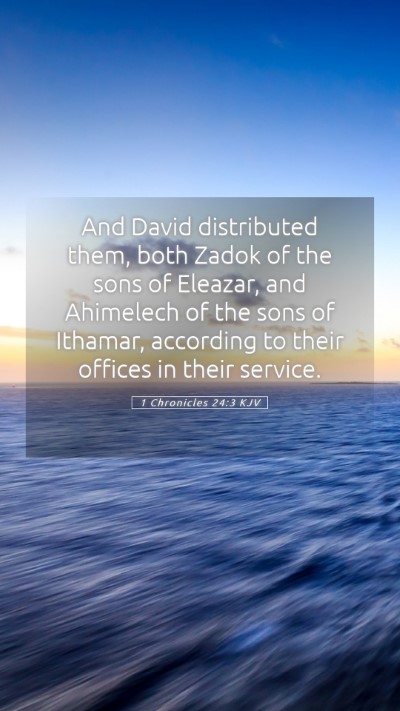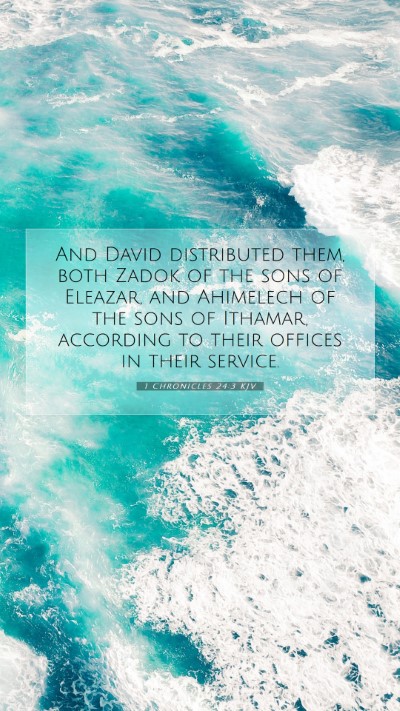Understanding 1 Chronicles 24:3
Bible Verse: 1 Chronicles 24:3
In 1 Chronicles 24:3, we find an account regarding the division of the priestly duties among the descendants of Aaron, specifically focusing on the family of Eleazar and Ithamar. This division is significant as it establishes an organized framework for worship and service in the temple, illustrating God's order in spiritual practices.
Commentary Insights
-
Matthew Henry's Commentary: Henry emphasizes the importance of the organization within the priesthood. He notes that by dividing the duties among the sons of Aaron, it fosters a sense of responsibility among the priests, preventing any one family from monopolizing the sacred duties. This arrangement highlights the necessity of order in worship and the equitable distribution of sacred responsibilities.
-
Albert Barnes' Commentary: Barnes provides insights into the context of these divisions, indicating that it reflects the broader theme of the Israelites' worship practices. He points out that the specific names mentioned and their roles serve to maintain a connection between the present priestly duties and the historical lineage, reinforcing the significance of hereditary roles in religious practices.
-
Adam Clarke's Commentary: Clarke elaborates on the logistical aspect of the divisions, explaining that such classifications ensure that worship practices are carried out effectively and that each priest understands their designated role. He argues that this structure not only honors the memory of their ancestors but also serves practical purposes in temple service.
Historical Context
The verse appears within a larger narrative focused on the organization of the Israelite community post-exile. The descendants of Aaron were called to lead worship, and their roles were vital for maintaining the spiritual health of the nation. This passage underscores the importance of lineage and duty in Jewish tradition, as well as the broader themes of order and community in worship.
Theological Significance
This verse illustrates how God desires order in worship and service. It also sets a precedent for the church in modern times, where structure and organization are essential for effective ministry. The priestly duties, as defined in this passage, can be reflective of various roles within a church community today.
Applications for Life
-
Understanding Our Roles:
Just as the priests had specific roles, we too are called to serve within our communities. Understanding our unique contribution can enhance cooperation and productivity.
-
Encouraging Structure in Worship:
This passage suggests that structure in worship can aid in focusing on God. Churches today can learn from this orderly approach to how they conduct services and uphold traditions.
-
Valuing Heritage:
Recognizing and honoring our spiritual heritage can encourage us in our faith journey. Just as the priesthood was rooted in family lineage, our spiritual roots can provide strength and guidance.
Related Bible Verses
- Exodus 28:1 - Discusses the garments and responsibilities of Aaron and his sons.
- Numbers 3:10 - Outlines the roles of the Levites regarding priestly duties.
- 2 Chronicles 23:18 - Refers to the establishment of priests in the temple services.
- Hebrews 7:11-14 - Explains the significance of priesthood in light of Christ's eternal priesthood.
Bible Study Insights
This verse can serve as a pivotal point in Bible study groups focusing on:
- Bible study lessons regarding the Old Testament priesthood.
- Scripture analysis that relates to worship and service in modern communities.
- Bible study resources that explore historical context and practical applications of biblical structures.
Conclusion
1 Chronicles 24:3 provides a comprehensive understanding of order in worship and the importance of priestly duties. Through the insights of respected commentaries, it becomes evident that God values structure within the church and that every individual has a unique role to play. Whether through personal reflection or in group discussions, this verse encourages us to seek understanding in our responsibilities and the divine order set forth in Scripture.


